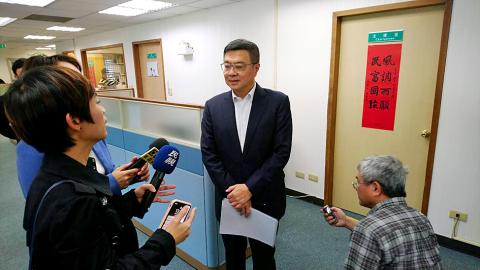Leading Democratic Progressive Party (DPP) members yesterday defended the Central Epidemic Command Center’s (CECC) decision to overturn the Mainland Affairs Council’s (MAC) announcement allowing the entry of Chinese children of Taiwanese and Chinese couples into Taiwan, and praised the Executive Yuan’s quick response.
Officials said that the move could have placed too much burden on already-strained domestic resources in the fight against COVID-19.
DPP Chairman Cho Jung-tai (卓榮泰) lauded the government’s quick response after MAC’s announcement on Tuesday drew a predominantly negative response.

Photo: Chen Yu-fu, Taipei Times
The Executive Yuan was quick in reading the pulse of public opinion, and put a temporary stop to that policy to reflect the will of Taiwanese, Cho told reporters at party headquarters in Taipei.
The council was acting in keeping with policies that are being implemented when it made the announcement on Tuesday. he said.
“However, it is clear that in light of the epidemic, the public believes that the government must prioritize protection of its citizens, and that their welfare must come first,” he added.
Asked if the MAC and other ministries have been rash in making decisions, Cho said that careful assessment and prudent examination are vital in the decisionmaking process.
“It is important that to safeguard Taiwan, government officials must be more flexible and sensitive to the needs and will of the public,” he said.
DPP Legislator Cheng Yun-peng (鄭運鵬) said that Taiwan had in recent years had many interactions with China.
It is not just the MAC, but legislators across parties have received many appeals and requests for assistance, including family problems, he said.
“I can understand that as school is about to reopen, the MAC and other officials have come under a lot of pressure, with appeals and requests for help for students going to school, along with personal and family situations,” he added.
Asked about the policy reversal, Cheng said: “This showed that the decision and its implications were not carefully assessed.”
However, “I am sure that [MAC officials] will be more prudent the next time,” Cheng added.
DPP Legislator Wang Ting-yu (王定宇) said that MAC officials made a “foolish” announcement on Tuesday.
“Right now, most Taiwanese are very worried about the ‘Wuhan virus’ and they are distrustful of the Chinese government,” Wang said. “As such, people were riled up and criticized MAC officials. I see this reaction as a very good thing for Taiwan, as it sends a strong signal of their discontent about the decision.”
“It was a rather foolish decision, and when it was announced I had already told them that the decision should be postponed,” he said.
“With Taiwan still combating the ‘Wuhan virus’ outbreak, which has strained our healthcare resources, and with the MAC failing to come up with a clear explanation, Minister of Health and Welfare Chen Shih-chung (陳時中), the head of the CECC, had to put a stop to the MAC’s policy,” Wang added.

Taiwanese can file complaints with the Tourism Administration to report travel agencies if their activities caused termination of a person’s citizenship, Mainland Affairs Council Minister Chiu Chui-cheng (邱垂正) said yesterday, after a podcaster highlighted a case in which a person’s citizenship was canceled for receiving a single-use Chinese passport to enter Russia. The council is aware of incidents in which people who signed up through Chinese travel agencies for tours of Russia were told they could obtain Russian visas and fast-track border clearance, Chiu told reporters on the sidelines of an event in Taipei. However, the travel agencies actually applied

Japanese footwear brand Onitsuka Tiger today issued a public apology and said it has suspended an employee amid allegations that the staff member discriminated against a Vietnamese customer at its Taipei 101 store. Posting on the social media platform Threads yesterday, a user said that an employee at the store said that “those shoes are very expensive” when her friend, who is a migrant worker from Vietnam, asked for assistance. The employee then ignored her until she asked again, to which she replied: "We don't have a size 37." The post had amassed nearly 26,000 likes and 916 comments as of this

New measures aimed at making Taiwan more attractive to foreign professionals came into effect this month, the National Development Council said yesterday. Among the changes, international students at Taiwanese universities would be able to work in Taiwan without a work permit in the two years after they graduate, explainer materials provided by the council said. In addition, foreign nationals who graduated from one of the world’s top 200 universities within the past five years can also apply for a two-year open work permit. Previously, those graduates would have needed to apply for a work permit using point-based criteria or have a Taiwanese company

The Shilin District Prosecutors’ Office yesterday indicted two Taiwanese and issued a wanted notice for Pete Liu (劉作虎), founder of Shenzhen-based smartphone manufacturer OnePlus Technology Co (萬普拉斯科技), for allegedly contravening the Act Governing Relations Between the People of the Taiwan Area and the Mainland Area (臺灣地區與大陸地區人民關係條例) by poaching 70 engineers in Taiwan. Liu allegedly traveled to Taiwan at the end of 2014 and met with a Taiwanese man surnamed Lin (林) to discuss establishing a mobile software research and development (R&D) team in Taiwan, prosecutors said. Without approval from the government, Lin, following Liu’s instructions, recruited more than 70 software